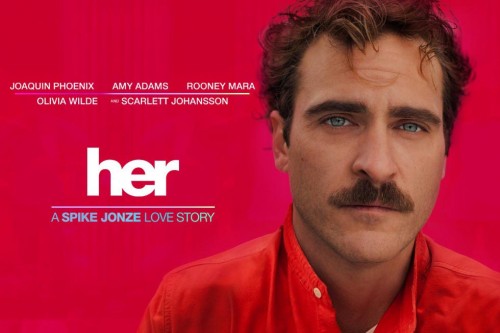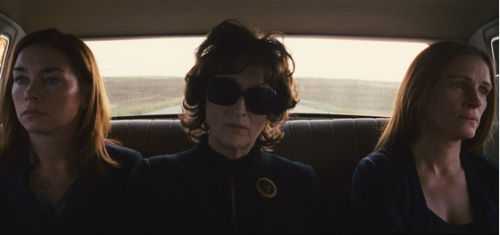
This guest post by Lisa C. Knisely previously appeared at Medium.
Her is an achingly beautiful film that adroitly explores postmodern alienation and the alterity at the heart of our relationships, both with other humans and our increasingly intelligent machines. I found the lonely, withdrawn main character, Theodore (played by Joaquin Phoenix), to be an immensely relatable and sympathetic protagonist.
But, that’s the problem.
Much like Joseph Gordon-Levitt’s character at the beginning of 500 Days of Summer, we know Theodore is a sensitive and depressed dude from the moment we see him listening to “melancholy songs” in the elevator as he leaves work at a large and impersonal office building in the city. And, like Jim Carrey’s character in Eternal Sunshine of the Spotless Mind, we soon come to find out that Theodore was once deeply in love with an emotionally complex and intelligent woman who has left him heartbroken. Films like Her bank on the audience’s ability to relate to the experiences of lost love and existentialist ennui of their main character. And we do. As, I think, we should.

But, as a woman in the audience, my relationship to these types of characters, who are reliably, predictably, boringly male, is fraught. I relate to them, but only insofar as I must continually reinvest in the myth that men are the only people who are truly capable, truly deep enough, of having wrenching crises of the soul. Even though I know this to be false in reality—women experience alienation and existentialist ennui, too (I can’t believe I even just typed that)—I am deeply troubled that the experience of this sort of angst seems to be the exclusive province of men in our cultural imagination.
Why are these stories we tell, stories about something I would venture to call essentially human, also largely stories about being men? As Noah Berlatsky points out in a piece for Salon.com, “In Her, difference is simply subsumed into a single narrative of midlife crisis and romance — everybody’s the same at heart, which means everybody is accepted as long as their stories can be all about that white male middle-age middle-class guy we’re always hearing stories about.”

And women? Well, we’re mostly relegated to the role of foils for man’s (meaning men’s) quest for meaning, transformation, and lasting human connection. As Anna Shechtmen writes in a piece for Slate.com, “Her commits the most hackneyed error of the big screen: It fails to present us with a single convincing female character—one whose subjectivity and sexuality exist independent of the film’s male protagonist or its male viewers.”
While I agree with Shechtmen’s assessment, I’d also wager that there is nothing particularly unusual about this state of affairs in a great many Hollywood films. That the main female character in Her is a disembodied operating system through which (whom?) Theodore’s subjectivity is revealed and transformed didn’t strike me as unusual. Zooey Deschanel’s character in 500 Days of Summer might as well have been a disembodied computer voice as far as I’m concerned. Ditto Natalie Portman in Garden State. Ditto Scarlett Johansson in Lost in Translation. Ditto Helena Bonham Carter in Fight Club. Ditto the real doll in Lars and the Real Girl. Ditto any film where the role of the main female character is to be a beautiful and sexually available aid to the male protagonist’s gradual transformation as he gains a deeper level of self-understanding as he learns to connect with others.

Maybe Samantha, the operating system voiced by Scarlett Johansson with whom Theodore falls in love in Her, is just the ultimate Manic Pixie Dream Girl. Or maybe Spike Jonze is critiquing contemporary heterosexuality in which men project their desires onto objectified women. As Shechtmen notes, “One could argue that Jonze knows just what he’s doing…he is foregrounding Samantha’s role as the dark screen upon which we can project our erotic and romantic fantasies.” Daniel D’Addario at Salon.com maintains that the critique of possessive masculine desire is exactly Jonze’s point in Her, writing, “[the] evocation of female sexuality as easily controlled isn’t what the film is telling us is inherently good; calling to mind the control Theodore seeks to have over women doesn’t mean Jonze is seeking the same control. If anything, making Samantha invisible totally forecloses the option of the ‘male gaze’….”
While there is an implicit feminist critique of masculine heterosexual romantic desire in Her, D’Addario is oversimplifying the concept of the male gaze. The male gaze, as it was developed by feminist film critics like Laura Mulvey, isn’t just about women being sexually objectified and gazed at on screen; it is more deeply about the way a film structures its viewpoint so that we, the audience, are made to see through the eyes of the (usually male) protagonist and thus identify with him. In Her, there is only one brief moment during the film where the camera switches and we see Theodore from Samantha’s viewpoint. Any other glimpse of her subjectivity we get solely through Theodore’s relationship to her.

One can argue that all people, of any gender, project a certain amount of fantasy onto others in our intimate relationships with them. This too, seems to be something definitive of human experience. And Her examines that experience thoughtfully, with complexity, pushing our conceptual understanding of what it is to be “human” at a moment in history when we are more and more becoming cyborgs.
Still, I have trouble coming up with a Hollywood film where a woman’s subjectivity, her struggle for meaning, self-transformation and connection with others, has truly taken center stage in such a way that men in the audience are expected to identify with her story as one that is universal. Even more unimaginable, and currently unrepresentable in our current cinematic landscape, is a film in which a man or men operates as a reflective vehicle for a woman’s existential journey.
Go see Her. Ache with Theodore. Enjoy the beautiful aesthetic of the film. But, take a minute to imagine, too, if Joaquin Phoenix had played Sam to Scarlett Johansson’s Thea instead. That’s a film I’m still waiting for someone in Hollywood to write, direct, and especially, to produce.
Recommended reading: “Meet Samantha, the Manic Pixie Operating System in Her: A Review in Conversation”
Dr. Lisa C. Knisely is a freelance writer and an Assistant Professor of the Liberal Arts in Portland, Ore.




